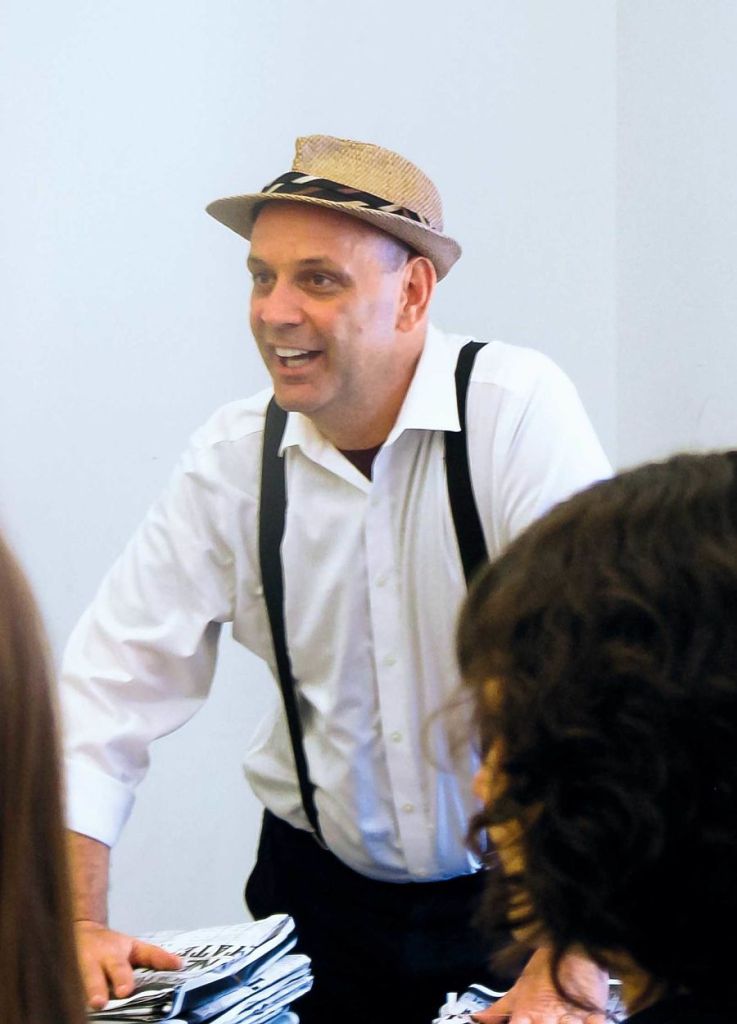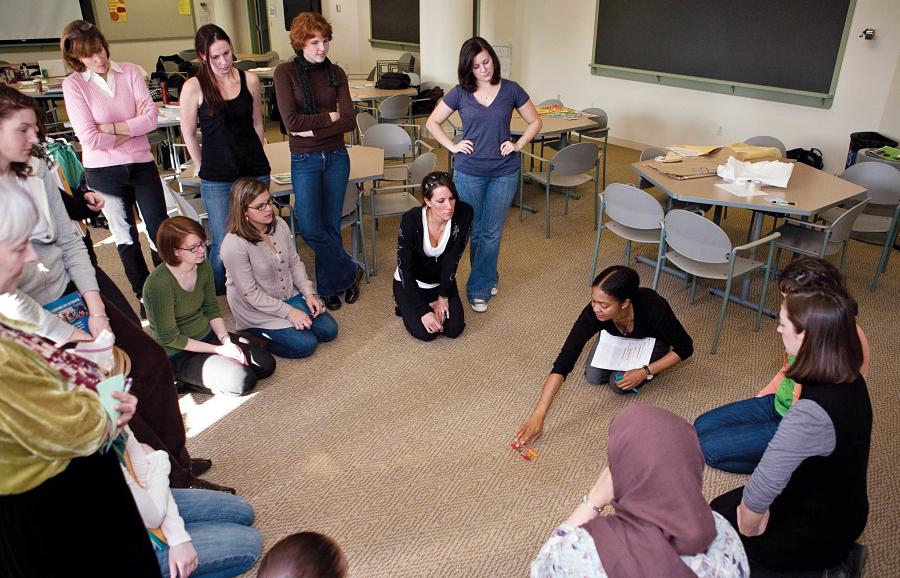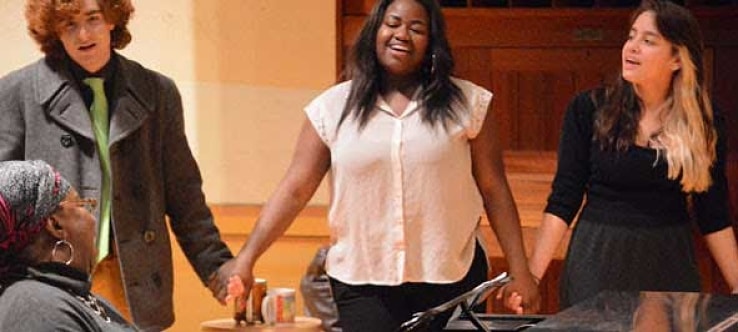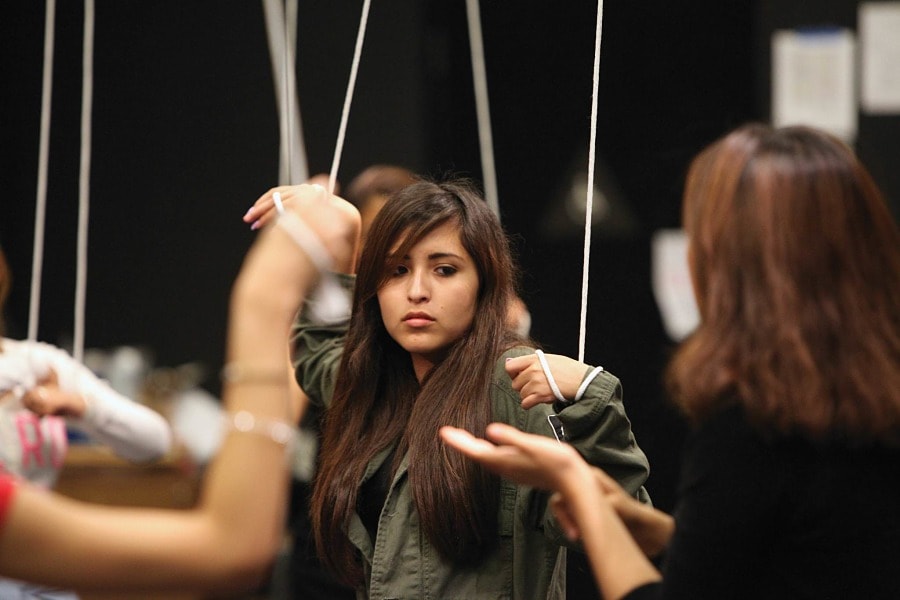Bertolt Brecht once said, “Art is not a mirror held up to reality, but a hammer with which to shape it.” The college and university programs below are innovatively merging theatre and social-justice initiatives with the intention to do just that.
This selection of programs is by no means comprehensive. Dozens of other schools as well as conservatory and ensemble training programs across the U.S. incorporate social action and civic engagement into their curricula, providing their graduates with practical and theoretical tools that function like Brecht’s “hammer”—stirring audiences, communities and even larger populations to purposeful action and change. The 13 schools cited here vary widely in focus, but all wear the badge of activist methodology with pride.
City University of New York
M.A. in Applied Theatre

The City University of New York (CUNY) has become a standard-bearer for socially conscious artists in training. The applied theatre M.A. at CUNY’s School of Professional Studies, the first of its kind in the U.S., is an ensemble-based program that promotes theatre as an instrument for social change. Chris Vine, the academic director, was formerly the education director of Creative Arts Team (CAT), a youth-empowering theatre organization that now partners with CUNY. In a recent project at the university, graduate student Michael Pantone led a performance piece based on the 1899 strike of newsboys and newsgirls that marked the 2013 Minimum Wage Day of Action.
According to Michael Wilson, the program’s assistant director, student productions and community projects at CUNY have led directly to post-degree careers. “We employ many students and alumni at Creative Arts Team, and we’ve just started an apprenticeship program.” He adds, “Our graduates are education directors—they run their own grant-giving projects. They take their student productions and tour them around the country.”
University of California–Los Angeles
The Skoll Center for Social Impact Entertainment
The newly launched Skoll Center for Social Impact Entertainment at UCLA’s School of Theater, Film and Television is open to both undergrad and graduate students at the university. The center’s $10-million endowment from philanthropist and Participant Media founder Jeff Skoll will enable UCLA TFT students to examine fundamental issues in American and global societies. The Skoll Center for SIE emphasizes three pillars to advance the power of entertainment and performing arts to inspire social change: research; education and special initiatives; and public programming and exhibitions.
Dean Teri Schwartz notes, “We believe that the work of this center will inspire, motivate and galvanize scholarly and creative works from our students, faculty and entire UCLA-TFT community around the power of story to inspire social change and to make a difference in the world.” One noteworthy initiative among many at the Skoll Center is an interdisciplinary class called “Engage L.A.: Social Impact Storytelling.” The course will focus on critical issues in Los Angeles, Schwartz explains. “We believe in the power of performing arts education to nurture and develop a new generation of diverse artists and scholars who will use their stories, their creative works and research to make a difference.”
University of San Francisco
Performing Arts and Social Justice Major
The PASJ major, as it’s known at USFCA, seeks to confront injustice through artistic expression. With concentrations in theatre, dance and music, the program encourages students to channel their talents toward activism through a variety of media. All three concentrations require students to create a yearlong original work that engages the community and ties in social action themes. This year, a student production of Christine Evans’s play Snow Falling Bird confronted the experiences of Middle Eastern refugees.
“We strive to offer the knowledge and skills that will educate our students to become better persons, not just better artists,” says Roberto Varea, USFCA’s theatre program coordinator. A recent production of Brecht’s The Good Person of Szechwan, he notes, was developed “in collaboration with a community of ex-offenders and survivors of violent crime.” Adds Varea, “Our performance and community exchange course has had successful partnership with the San Francisco County Jail and pairs our students with inmates placed in their restorative justice program.”
University of Southern California
M.A. in Applied Theatre Arts
Augusto Boal’s Theatre of the Oppressed sits at the core of the applied theatre arts master’s program within USC’s School of Dramatic Arts, and it informs every facet of the curriculum, from coursework to performance. Professor Brent Blair, director of the master’s program, has cultivated partnerships and travel opportunities that enrich his students both as humanitarians and as artists. Among such opportunities are fully funded month-long international externship residencies in various countries, most recently India.
The program also embraces its local community, Los Angeles, as a center for social-justice work. One of the most valuable workshops available to Blair’s students is an internship project with Los Angeles High School for the Arts. Last year, students spent nine months in residency working on themes of discrimination with urban Los Angeles youth. Blair also oversaw an undergraduate partnership with a branch of the United World Congress. “Our students created a project with local street vendors challenging current laws prohibiting licensing or legalization of this necessary economic practice,” Blair says. “For the street vendors, being their own boss was an exceptionally vital option to begin to take back ownership of their lives, their pocketbooks and their safety.”
Cal Poly Pomona
B.A. in Theatre Education and Community
Community service and partnerships are essential to the theatre program at Cal Poly Pomona, which features a required course in community-based theatre. Each year, the community partner varies, providing a wide breadth of outreach and engagement opportunities that cover a range of social issues. Among recent partners was First Responders, an amalgam of firefighters, paramedics and emergency room personnel. Program chair Bernardo Solano has helped foster a long-term relationship with Cornerstone Theater Company and is writing a full-length play for Cornerstone about first responders, based on class materials.
Professor Solano notes that his students dedicate themselves quite fully to their artistic projects because they select the topics that motivate and propel them. “Last year we had two students who were so inspired by the [community-based theatre] course that they created their own project with the LGBTQ community on campus and made it their senior project. It culminated in a production in which they acted alongside members of the LGBTQ community.”
Lesley University
M.A. in Arts, Community and Education
Lesley University of Cambridge, Mass., has a master’s program that offers theatre studies as an area of specialization, providing its graduate students with the training to create social change through art. Focused on professional development as well as creative expression, the program places an emphasis on developing concrete skills in grant writing, arts administration, networking, arts-based research and community advocacy. Elective courses are encouraged to further tailor each student’s interests and artistic goals.

According to program director Priscilla Sanville, graduates of the M.A. program pursue careers across a spectrum of community engagement, “from traditional performance to gallery showings to youth-delivered street performance, to film festivals, storytelling and poetry slams. This program reaches into the community, and the goal is to create social change in diverse communities.”
University of Minnesota–Minneapolis
M.A./Ph.D. in Theatre Historiography
The theatre department at the University of Minnesota has become a sought-out destination for young artists, from the B.F.A. actor-training program at the Guthrie Theater to the M.A./Ph.D. program in theatre historiography. This graduate program explores the many dimensions through which theatre (and performance in general) has had social, cultural and political consequences throughout history. Field seminars for graduate students include “Performance and Political Modernity” and “Avant-gardes,” among other courses.
Professor Sonja Kuftinec, an expert on performance and social change, aims to give her students “an understanding of how histories get made” as well as “the ability to ask what stories are not being told.” Kuftinec, who specializes in how theatre facilitates encounters between youth in conflict zones like the Balkans and Israel-Palestine, adds that her students must have “the capacity to build authentic long-term relationships and to understand that theatre is not the answer to every social problem.” Quoting organizer Ella Baker, she notes, “Your task is sometimes to not do, but to see what others are already doing. ‘Offer a light and the people will find their way.’”
New York University’s Tisch School of the Arts
Minor in Applied Theatre
At Tisch School of the Arts, applied theatre is predicated on taking theatre practice outside of traditional theatre spaces and into other arenas, such as “education, medicine, political activism, community work and social services,” according to the program’s online description. A notable facet of the applied theatre minor is that it encourages students to take their performances into neighborhoods around New York City. One recent student production, Exposed Brick, was performed as a traveling play through the Lower East Side; it addressed the history of immigration and gentrification in Lower Manhattan.
Rosemary Quinn, associate chair for theatre studies, who oversees the program, noted that the tools needed for social justice are commensurate with those needed to be a theatremaker—both depend, she says, on “listening skills, facilitation skills, ability to assess problems, practice in making clear choices, and a strong sense of one’s own moral compass.”
Sarah Lawrence College
M.F.A. in Theatre/Training Program in Theatre Outreach
Sarah Lawrence, in Bronxville, N.Y., is home to a dynamic theatre program led by Obie Award winner and Sarah Lawrence alumnus Dan Hurlin. The theatre M.F.A. at the college offers an outreach training program that utilizes art as a means to address societal issues. Its foundational course, “Methods of Theatre Outreach,” instructs students on engaging with various communities, particularly in cross-cultural settings. This hands-on experience aims to give M.F.A. graduates the tools for arts production as well as social change.
At the helm of the theatre outreach program are professors Allen Lang and Shirley Kaplan, who have written and directed new work for their students. Their most recent piece—a collaboration with the Hudson River Museum based on themes of self-acceptance—has had performances at the museum and at public schools in Yonkers, N.Y. Under Lang and Kaplan’s guidance, the program has confronted socially charged topics such as bullying and ethical behavior on social media.
Virginia Tech
M.F.A. in Directing and Public Dialogue
Virginia Tech’s M.F.A. program provides professional training for theatre directors, covering a variety of performance styles that students can tailor to their interests. What separates Virginia Tech from comparable directing M.F.A. programs is its emphasis on creating community partnerships alongside productions. The artist as an “engaged citizen” is the program’s focus, leading students to pursue projects that merge theatre and social justice. A one-on-one tutorial-based curriculum lets graduate students approach their work from a variety of backgrounds and disciplines.
How does this format facilitate social change? Susanna Rinehart, associate professor and chair of theatre and cinema, says the program gives students space to “develop a passion, a voice and an artistic vision; directing skills in conventional and non-conventional theatre spaces; leadership strategies for the development of an ensemble of theatre artists; and grounding in theory and analysis of human interaction—personal, social and political.”
University of Texas at Austin
M.A., M.F.A. and Ph.D. in Performance as Public Practice
Taking performance into public spheres is the central focus of the M.A., M.F.A. and Ph.D. graduate programs at the University of Texas. To that end, the curriculum incorporates numerous courses in the study of pedagogy, historiography, public policy, performance analysis, ethnography and dramaturgy, as well as theatre practice itself. To deepen their studies further, students learn second and third languages. The rigorous program enables students to pursue positions as scholars, artists and teachers.
Professor Charlotte Canning, who heads the graduate program, has seen her students embrace activist roles “around a range of issues, from incarceration to LGBTQ rights to reproductive rights to immigration to race.” The multidisciplinary approach is intended “to think about the larger contexts in which performance occurs.” UT also offers an M.F.A. program in drama and theatre for youth and communities.
Brandeis University’s International Center for Ethics, Justice and Public Life
Minor in Creativity, the Arts and Social Transformation
Within Brandeis’s International Center for Ethics, Justice and Public Life is a groundbreaking program called Peacebuilding and the Arts. A leader in for social justice programming among university campuses, Brandeis created Peacebuilding and the Arts to give artists working in conflict zones a toolkit for enacting positive change. Students are encouraged to document their work and share their productions with colleagues and peers. The school’s new minor (Creativity, the Arts and Social Transformation) offers students a multivalent education across the arts, humanities and social sciences, combined with internship opportunities with a variety of organizations.

As professor Cynthia Cohen, the program’s director, sees it, art can be as effective as diplomacy. “The arts are wellsuited to peace-building because they can reach beneath people’s defenses, and encourage people to open their minds to new ideas and their hearts to people who have been adversaries.” She adds, “Through their beauty and their composition, the arts support us to face circumstances that might otherwise be impossible to countenance.”
The New School for Liberal Arts’s Eugene Lang College
B.A. in Theatre
At the New School in New York City, civic engagement is a university-wide priority, so it’s fitting that the theatre department places emphasis on the role of artist as citizen. Theatre program coordinator Zishan Ugurlu believes that the arts are among the most powerful conduits of social change. Last spring, Ugurlu conceived and directed a student production titled Marathon Dancing: Letters to Wall Street in an Era of Wonderful Nonsense, based on Horace McCoy’s novel and its film adaptation “They Shoot Horses, Don’t They?” and the economic crisis of 2008. The program also produced From the Fire, a musical commemoration of the 1911 Triangle Shirtwaist Factory fire on that tragic event’s 100th anniversary. The production went on to perform at the 2011 Edinburgh Fringe Festival, where it won awards for best musical, best music and best new production.
Integrally involved in her students’ theatre practice, Ugurlu spearheaded a prison program entitled “Rehabilitation Through the Arts.” The program included workshops with inmates at Sing Sing Correctional Facility as well as with ex-prisoners. Eugene Lang College’s theatre department also partners with the I Have a Dream Foundation, which helps enable children in low-income communities achieve higher education.
Lonnie Firestone is a frequent contributor to this magazine.


